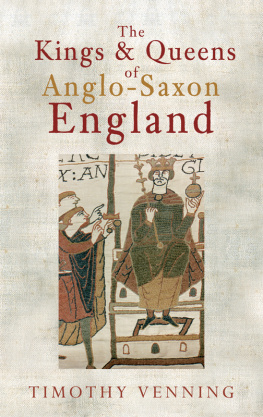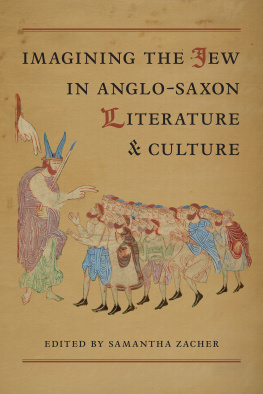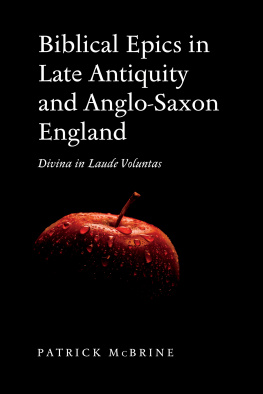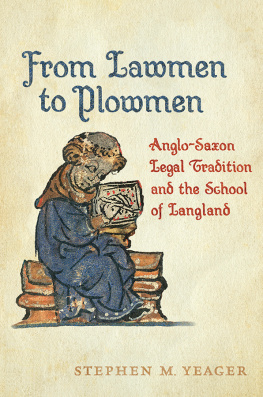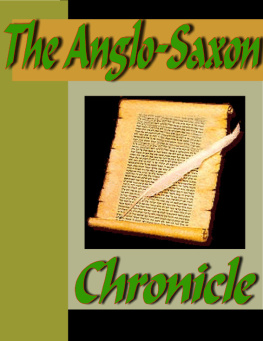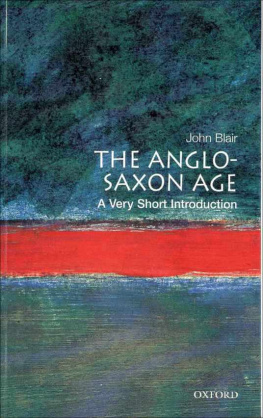FINDING THE RIGHT WORDS:
ISIDORES SYNONYMA IN ANGLO-SAXON ENGLAND
CLAUDIA DI SCIACCA
Finding the Right Words:
Isidores Synonyma in
Anglo-Saxon England

University of Toronto Press Incorporated 2008
Toronto Buffalo London
www.utppublishing.com
Printed in Canada
ISBN 978-0-8020-9129-1

Printed on acid-free paper
Library and Archives Canada Cataloguing in Publication
Di Sciacca, Claudia
Finding the rights words : Isidores Synonyma in Anglo-Saxon England/
Claudia Di Sciacca.
(Toronto Old English series)
Includes bibliographical references and index.
ISBN 978-0-8020-9129-1
1. Isidore, of Seville, Saint, d. 636. Synonyma. 2. Devotional literature, Latin
(Medieval and modern) England History and criticism. 3. Devotional
literature, Latin (Medieval and modern) Translations into English. 4. English
prose literature Old English, ca. 4501100 History and criticism. 5. Spirituality
England History Middle Ages, 6001500. I. Title. II. Series.
BX4700.I78D4 2008 274.2'03 C2007-907071-X
University of Toronto Press gratefully acknowledges the financial assistance of
the Centre for Medieval Studies, University of Toronto, in the publication of
this book.
University of Toronto Press acknowledges the financial assistance to its publishing
program of the Canada Council for the Arts and the Ontario Arts Council.
University of Toronto Press acknowledges the financial support for its publishing
activities of the Government of Canada through the Book Publishing
Industry Development Program (BPIDP).
Sag mir wo die Blumen sind
Wo sind sie geblieben?
Contents
Preface
This book is an extensively revised version of my PhD thesis submitted to the University of Cambridge in June 2002. It concerns the transmission and use made in Anglo-Saxon England of the work by Isidore of Seville known as Synonyma. Generally classified among Isidores minor works, the Synonyma enjoyed a wide and long-lasting success in the medieval West and they became one of the classics of medieval spirituality as well as the main and most characteristic source of the so-called stilus ysydorianus, a rhymed, rhythmical prose the main feature of which is the pervasive use of synonymical variation and paraphrase and which was to become one of the four major kinds of Latin Kunstprosa in the Middle Ages.
Anglo-Saxon England was particularly receptive to the Synonyma, which represented a rich source of devotional and penitential motifs as well as a model of style. This study provides a general survey of Isidores life and activity as a bishop in early seventh-century Visigothic Spain as well as an introduction to the Synonyma, their theme, structure, and distinctive style. Successive chapters focus on the transmission of the Synonyma to England, providing a close examination of the Anglo-Saxon branch of their manuscript tradition, and on their vernacularization, that is translations, adaptations, and any use of the Isidorian text as a source in Old English texts. Such vernacularization seems to have extensively occurred especially within anonymous homilies. At least a lengthy adaptation of the Synonyma is attested in Vercelli homily xxii, and a detailed analysis of the content and style of the latter homily shows the original and ingenious use of the Latin source by the Anglo-Saxon homilist. The Synonyma were also the main ultimate source for the ubi sunt topos, a favourite theme not only in Old English homilies, but in Anglo-Saxon literature as a whole. A survey of this motif in both Old English and Anglo-Latin prose and verse shows the ingenuity and ease with which the Anglo-Saxon writers adopted and adapted their sources, as well as the creative tension between Latinate Christian material and rhetorical devices typical of the vernacular literary tradition.
Further evidence shows that the Synoynyma exerted significant influence on devotional literature, and also played a relevant role in the tradition of Anglo-Latin scholastic colloquies. Indeed, the synonymical style may well have been implemented in the teaching of Latin by the Benedictine Reformers, among whom may have been thelwold himself. The Synonyma can definitely contribute to our understanding of the pedagogical practices of late Anglo-Saxon England and close study of the text offers new insights into the interaction of Latin and vernacular within the essentially bilingual culture of Anglo-Saxon England.
This book could not have been completed without the generous help and support of teachers, friends, and family. My studies in Cambridge have benefited enormously from the scholarship of my three supervisors, Professor Michael Lapidge, Dr Rosalind Love, and Professor Andy Orchard. I particularly profited from the generosity, intellectual guidance, and scholarly insights of the latter, and to him I would therefore like to express my deepest gratitude. I also wish to thank Professor Patrizia Lendinara, who first taught me Old English. Throughout my studies she has consistently offered me scholarly advice, practical help, and moral support. The long process of revision from the thesis to this book has profited from the insightful comments of my two PhD examiners, Professor Malcolm Godden and Dr Richard Dance, as well as from the stimulating remarks of the two UTP anonymous referees who have read the manuscript. I have also learnt a lot from the exchanges with a number of Anglo-Saxonists and medievalists over the last years. In particular, I would like to thank Professors T.N. Hall and C.D. Wright, whose work has been of much inspiration.
My warmest thanks to Emily Thornbury for reading most of the manuscript and saving me from numerous blunders. Needless to say, the infelicities of expression and mistakes that remain are entirely my own. Emily has also been my longa manus in the Cambridge UL, and Elena Alcamesi has always been generous with bibliographical help and advice over word-processing queries. I am also grateful to Jacques Elfassi for thought-provoking discussions on Isidore and the Synonyma, and to Dr Suzanne Rancourt, Humanities Senior Editor, and Barbara Porter, Associate Managing Editor at UTP, for their help and patience. It has certainly been a pleasure working with them.
Finally, I owe a great deal to my parents, Aldo and Magda, and to the friends who have stood by me during this long venture: Katherine Abell, Sara Diemoz, Agathe Dorsch, Trude Macr, Gianmauro Merendino, Vittorio Montemaggi, Monica Raffaele Addamo, Janie Steen, and Prisca Straub. Last but not least, thanks to Vladimiro Caminiti for his advice on how to keep going strong, and to Raffaella Palumbo for being there in a stressful time.
CLAUDIA DI SCIACCA
Udine, 2 April 2007
Abbreviations
ACMRS Arizona Center for Medieval and Renaissance Studies
AL Archivos Leoneses
ALL I Michael Lapidge. Anglo-Latin Literature: 600899. London and Rio Grande, OH: Hambledon Press, 1996
ALL II Michael Lapidge. Anglo-Latin Literature: 9001066. London and Rio Grande, OH: Hambledon Press, 1993
ALMA Archivum Latinitatis Medii Aevi (Bulletin du Cange)
ASE Anglo-Saxon England
ASPR Anglo-Saxon Poetic Records
BAV Biblioteca Apostolica Vaticana
BEASE Michael Lapidge, John Blair, Simon Keynes, and Donald Scragg, eds. The Blackwell Encyclo-paedia of Anglo-Saxon England. Oxford: Black-well, 1999
Next page

